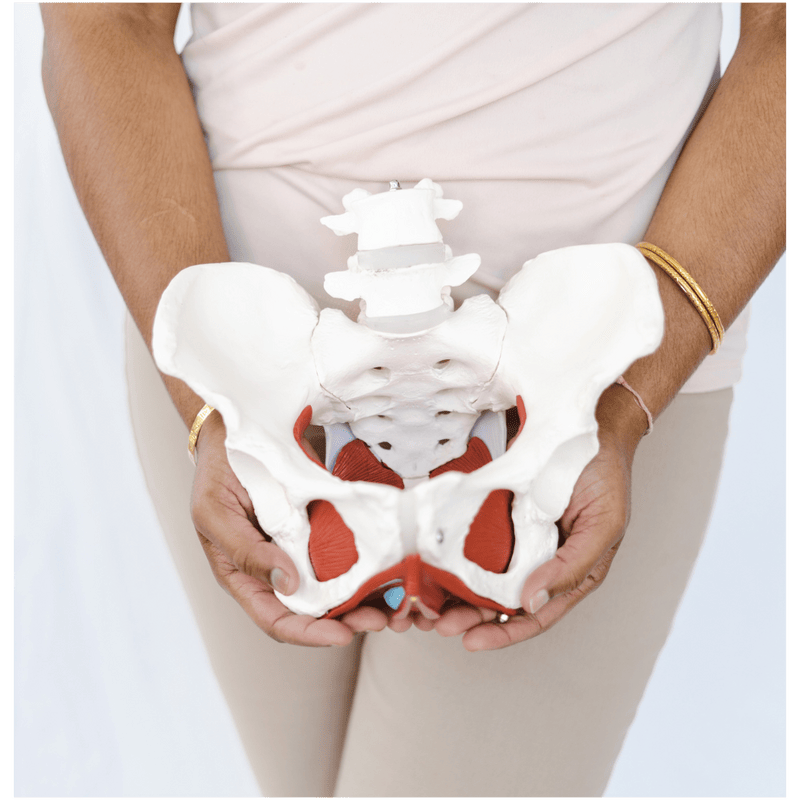
Understanding Your Pelvic Health
Pelvic health revolves around the strength and function of your pelvic floor muscles, which support the bladder, bowel, and, in women, the uterus. Maintaining their health is essential for overall well-being and a better quality of life.
Common Pelvic Problems
You might not hear much about pelvic floor issues, but they’re quite common. Conditions like urinary incontinence, pelvic organ prolapse, and chronic pelvic pain affect millions of people. In fact, studies suggest that nearly one in three women experiences some form of pelvic floor disorder in their lifetime, and about one in four women over the age of 20 experience symptoms related to the pelvic floor, such as stool or urine leakage. (The University of Chicago Medicine).
Everyday Habits Messing with Your Pelvic Health

Sitting Too Much
How often do you find yourself sitting for long periods—at your desk, in front of the TV, or during a long commute? Prolonged sitting can weaken your pelvic floor muscles, but small changes can make a big difference. Try to:
✔ Take short breaks every hour to move around.
✔ Use a standing desk when possible.
✔ Incorporate gentle stretches throughout the day.
This simple mobility routine is a great way to stretch, reset, and support your pelvic health!
Bad Posture Habits
Slouching isn’t just tough on your back—it can also put stress on your pelvic floor. Good posture plays a key role in pelvic health. Here’s how to improve yours:
✔ Keep your shoulders relaxed and down (if you have tight shoulders and neck, try this fascia mobilization for quick relief).
✔ Engage your core for added support.
✔ Keep your head aligned with your spine to reduce strain.
Small adjustments can make a big difference in how you feel!
Not Drinking Enough Water
Believe it or not, dehydration can contribute to pelvic health problems.
When you don’t drink enough water, you might end up straining more during bowel movements, which isn’t good news for your pelvic floor. Aim for at least eight glasses of water a day to stay hydrated.
Bathroom Mistakes
Your bathroom habits play a bigger role in pelvic health than you might think. Straining or rushing can lead to issues over time. Protect your pelvic floor with these simple tips:
✔ Take your time—don’t force it.
✔ Sit with your feet flat on the floor for better alignment.
✔ Relax and avoid straining.
A few mindful adjustments can make all the difference! Watch this video for additional expert tips on proper bathroom posture and techniques.
Eating the Wrong Foods
Some foods can irritate your bladder and pelvic region, leading to discomfort and potential issues. Support your pelvic health by:
✔ Limiting caffeine and alcohol.
✔ Reducing spicy and acidic foods.
✔ Adding more fiber-rich foods to your diet for better digestion and balance.
Small dietary changes can make a big difference in how you feel!
Making Positive Changes For Better Pelvic Health
Get Moving with Simple Exercises
Consistent exercise, especially movements that engage the pelvic floor, can strengthen these muscles and enhance overall well-being. Try adding:
✔ Kegel exercises for targeted muscle activation.
✔ Pelvic tilts to improve stability and control.
✔ Yoga or Pilates for flexibility and core strength.
A strong pelvic floor supports better posture, balance, and daily function!
Stand Tall with Good Posture
Maintaining proper posture throughout the day helps reduce strain on your pelvic floor. Optimize your workspace with these ergonomic adjustments:
✔ Set your chair and desk at the right height.
✔ Choose a supportive chair for better alignment.
✔ Position your screen at eye level to prevent hunching.
Small changes can make a big difference in your comfort and pelvic health!
Drink Up and Eat Right
Proper hydration and a balanced diet play a vital role in pelvic health. Simple daily habits can make a big difference:
💧 Keep a water bottle handy to stay hydrated.
🥦 Snack on fresh fruits and veggies for fiber and nutrients.
🚫 Limit bladder irritants like caffeine and alcohol.
Small changes lead to lasting benefits!
Good habits to form in the bathroom
Healthy bathroom habits can go a long way in supporting your pelvic floor. Remember to:
- Go when you need to, but don’t hold it in too long.
- Sit properly and relax.
- Avoid pushing or straining.
Take Charge of Your Pelvic Health today!

Taking care of your pelvic health doesn’t have to be daunting. By making small adjustments to your daily habits, you can significantly improve your pelvic floor health. Remember, little changes can lead to big results!
What Are the Common Symptoms of Pelvic Floor Issues?
Pelvic floor issues can manifest in various ways, including urinary incontinence, pelvic pain, lower back pain, and a feeling of heaviness or pressure in the pelvic area. If you experience any of these symptoms, it’s essential to seek professional help.
How Can Pelvic Floor Therapy Help Improve My Quality of Life?
Pelvic floor therapy is designed to strengthen and improve the function of the pelvic floor muscles, which can alleviate symptoms like incontinence, pelvic pain, and discomfort during daily activities. Take the first step toward a better quality of life by booking your session with one of our pelvic floor therapists.
How Often Should I Do Pelvic Floor Exercises?
Pelvic floor exercises, like Kegels, should ideally be done daily for the best results. Consistency is key in strengthening these muscles and improving your pelvic health. Our team at Pelvic Soul can create a personalized exercise plan that fits your lifestyle and helps you achieve optimal results.
When Should I Seek Professional Help for Pelvic Floor Issues?
If you’re experiencing persistent symptoms like incontinence, pelvic pain, or a feeling of heaviness in your pelvic area, it’s crucial to seek professional help sooner rather than later. Early intervention can prevent symptoms from worsening and improve your overall quality of life. Contact us to schedule a consultation with our experienced therapists and take control of your pelvic health today!
Break the Cycle of Hidden Habits Affecting Your Pelvic Health!
Sign up for our updates and receive informative articles on pregnancy, birth, postpartum support, and pelvic health right in your inbox!
Click the button below to join our community.
No spam, just valuable tips to support your journey to wellness.







